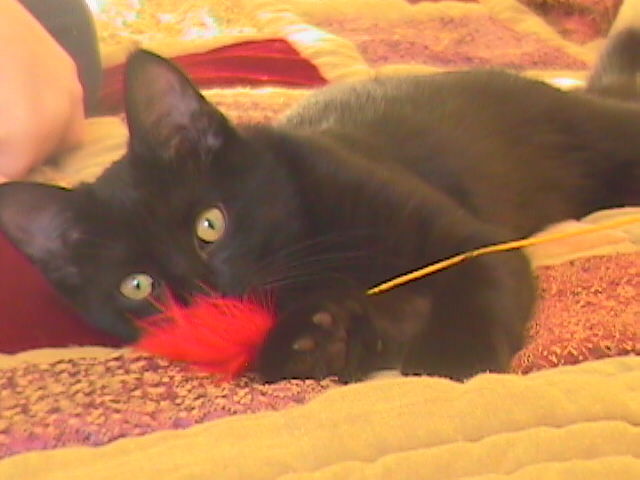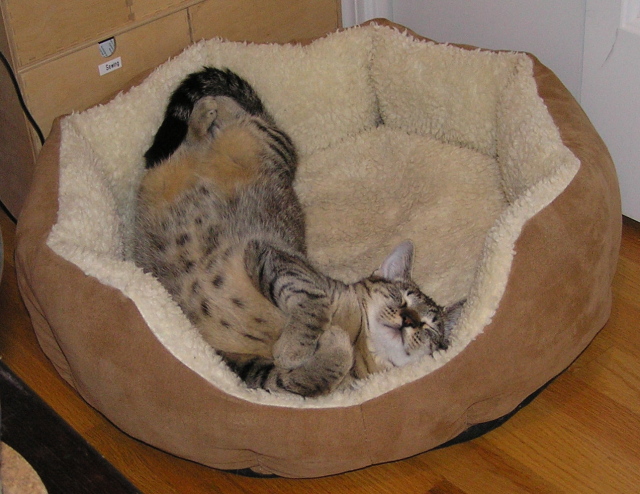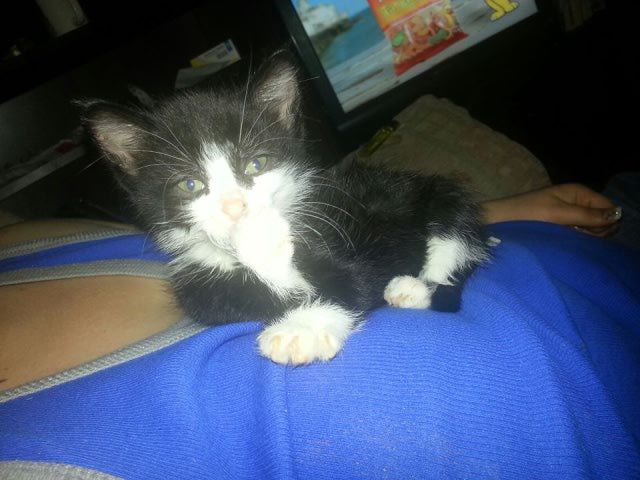QuestionWhat can I safely due to get my 17 1/2 year old, deaf male cat to stop howling in the early morning hours. He is in generally good health for his age except for his deafness. He wakes me up howling constantly from between 3 & 4 a.m. every morning. I am not getting much sleep. He sleeps all day, is an indoor only cat, lives with 12 other cats whom he likes but prefers people. He is learning to adjust to my hand signals and body language for communication, except for the howling. He has always been somewhat vocal. I am a firm believer in natural medicines for animals, do not believe in over vaccination or putting them on drugs to control anxiety etc. and have ended up in arguments with vets who believe phamaceuticals are the answer to everything. I live in Canada where holistic/natural vetcare has not caught on all that well. I also live in a rural area. He is on holistic, pure natural foods as I am not too trusting of the pet food industry these days. As he is deaf I give him lots of extra attention, cuddles and take care not to startle him. When he starts to howl, I pick him up and take him into the bed with me and cuddle and massage him to get him to relax. He will tolerate this for about 15 minutes and then he is up and wandering and howling again. He then sleeps all day and is quiet all evening until the early morning hours. I have given him Rescue Remedy, usually about 12 at night before I go to bed and sometimes this will calm him til about 5 a.m. I give him about 4 drops in some water (by dropper). Last night it didn't work, he started in at 3 a.m. I have lots of patience and am willing to try to do anything that will help him and me adjust (my husband is another issue, most men don't like having their sleep disturbed.) He also likes to put his paws in the water bowl and splash around but he has done this for a few years and has a depth perception problem. Any ideas on this one. I cannot change the location of his water bowl as he gets upset so I have a big rubber mat under the bowl to keep the water off the floor. Having several cats makes it a wee bit more difficult. I also do not want to isolate him in a separate room as this would be traumatic and I feel cruel as he would not understand why he is being isolated. Bad enough that his world is so quiet. I have worked in feral/stray rescue for over 15 years (hence the reason I have so many cats, I kept those that couldn't be placed or had handicaps) and have dealt with all sorts of illness and issues but never an older, deaf cat. I also have a 16 1/2 year old female cat who only has a little hearing in her left ear and she is very quiet but then she always was a quiet cat so I guess personality is also involved. Both cats have been vet checked for illness but most vets don't have an answer for this short of putting him on prosaic. Maybe you have some ideas or suggestions. They would be greatly appreciated.
AnswerMaureen,
At almost 18, your cat is approximately 88 years old in human years. At that age you can expect several age-related ailments and behaviors. Your cat may be going blind also which, with his deafness, has him frightened and confused. He may also have kitty Alzheimers which would also make him confused and exhibit odd behavior. Cats that are deaf rely on vibrations, when everyone is asleep there are no vibrations to tell the cat where everyone is and they cry. If he is also blind (it's sometimes hard to tell on an older cat that acts normal) then the situation is scarier for them. It is confusing and frustrating to him and he needs your reassurance and love now more than ever.
Here is a very good article about deaf cats:
(copy and paste, or type, the whole link into your address bar)
http://www.cats.org.uk/catcare/leaflets/VET04-Deafcats.pdf
The cat may also be in pain, also which would cause him to cry. That would include arthritis which, after laying still may hurt him when he starts to move around.
Holistic medicine is good in alot of ways, but regular medication is also needed in some instances. I wouldn't suggest Prozac for an elderly cat, but 'comfort meds' to alleviate and ease pain are beneficial, and sometimes necessary, for the cat's comfort and to extend his quality of life.
For a cat that age I would find a vet that is a specialist in the care and conditions of the geriatric cat. Not all vets understand the aging process and vets who don't know, and treat geriatric cats, can/will treat and medicate a cat as if it were a younger cat which can be detrimental to the cat and his health.
I am including my two favorite links for geriatric cat information. I hope they will be helpful to you and your kitty:
http://www.sniksnak.com/resources/geriatric.html
http://www.messybeast.com/towards-end.htm
(this site is up and down alot. If it quits working try again)
And if you do need to put poor kitty to sleep at some point, or he passes away, here is an EXCELLENT site for emotional support and a beautiful tribute site for people who have lost their beloved pets:
http://rainbowsbridge.com/hello.htm
As for the water bowl, NO, I would not ever want to isolate him! That would add stress and trauma that he doesn't need right now. I would get a shallow plastic container with low sides and put his water dish inside of it. When he splashes the water will be contained in the bottom container. OR you can put the water dish on a raised object where it would be more difficult for him to splash it but easy enough to drink out of.
I hope for the best. And it sounds like kitty has a lot of heart. It's never easy to go through when they get old. It takes a lot of patience and some inconveniences. Your kitty is lucky to have a caring, loving owner.
Tabbi

 very timid cat
QuestionMoxie
QUESTION: i have a cat(moxie) that
very timid cat
QuestionMoxie
QUESTION: i have a cat(moxie) that
 New Kitten
QuestionCat litter in kitchen
QUESTION: I adopte
New Kitten
QuestionCat litter in kitchen
QUESTION: I adopte
 Change in cat behaviour
QuestionCurry, before kittens
QUESTION: Hi Shant
Change in cat behaviour
QuestionCurry, before kittens
QUESTION: Hi Shant
 will my cats ever get on?
Question
shola shadow
a couple weeks ago i
will my cats ever get on?
Question
shola shadow
a couple weeks ago i
 Tantrums
Question
London.
Hi.
I have a cat that is just a little
Tantrums
Question
London.
Hi.
I have a cat that is just a little